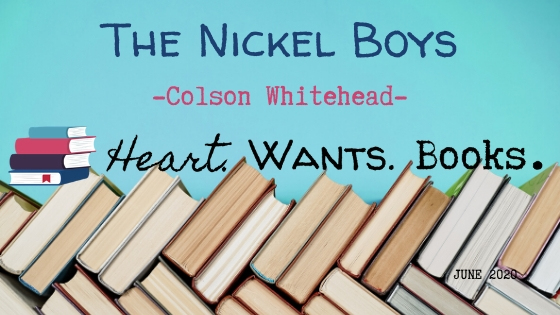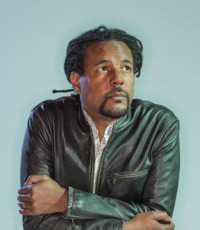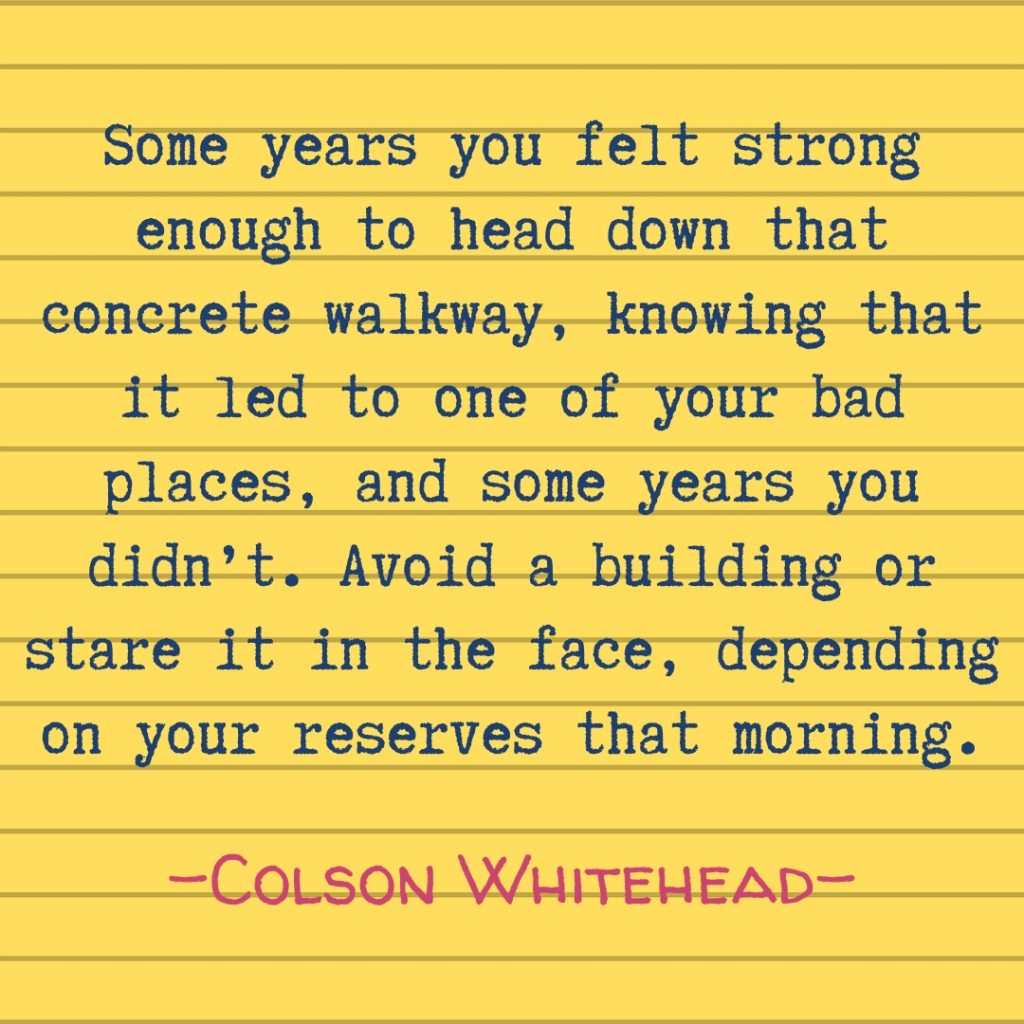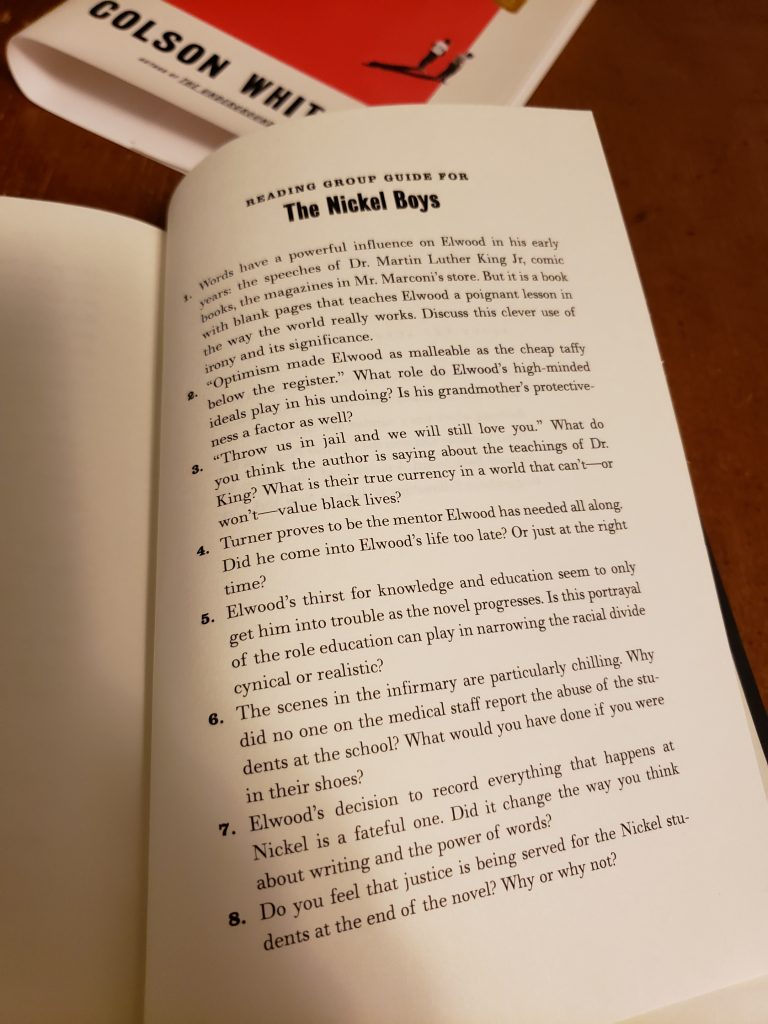The Nickel Boys by Colson Whitehead June 4, 2020

The following post includes affiliate links. More details here.
When Ashley told me Colson Whitehead’s The Nickel Boys was the August 2019 Barnes and Noble Book Club pick, I’m confident I groaned, or something similar, after reading the synopsis. (As we’ve already discussed, I’m an escapist reader. I’ve been pushing myself to read more non-fiction, but in general, it’s not my jam like fantasy or romance are. I can hang with historical fiction, but with so much WWII fiction hitting the bookshelves in recent years, I’m being selective about the heavy fiction I read.) However, when my book buddy is going to read a new book by a Pulitzer Prize winning author that feels important for me to read (yes, Whitehead won for The Nickel Boys in 2020 AND for The Underground Railroad in 2017), I recommend it to the library and read it as soon as possible.

And now for confession time, dear readers, we read this back in August 2019, so it’s been a while. When we read it, we’d been buddy reading consistently for several months, and had already started the pre-work for Heart.Wants.Books. You might be thinking, but with all the books you read, don’t you forget them? Well, sometimes yes, and sometimes they’re hard to differentiate if we read two similar titles close together. You might also be thinking, but can you really do this book justice talking about it so many months after reading it? Dear readers, I have no desire to do this book justice. Whitehead won the Pulitzer Prize for it, that should speak volumes. My goal is to help you find the right book for you. I’m confident we can do that goal justice with this title (and also, we did some skimming to help write this post).
The Nickel Boys is a novel based on a real “reform school” that operated for over a century and traumatized thousands of children. We follow Elwood, a black teen in 1960s Florida, as he works hard and is about to start classes at the local community college. He is unfairly arrested, then convicted and sentenced to a juvenile reformatory where the residents (inmates/students) call themselves the Nickel boys. If you’re thinking of the teenage version of chain gangs and prison farms, you’ve about got it, but following Elwood and his new friend Turner through their lives at the ‘school’ is a much clearer impression compared to the brief clips and vague explanations I’ve seen in the past.

This book is a heavy, challenging read. The content is openly presented, including brutal acts of violence (yes, trigger warning; they’re not gratuitous, but they’re definitely present). The writing is measured and honest. Whitehead doesn’t beat about the bush or include flowery, poetic phrasing. He’s direct and concise. The epilogue is everything I wanted it to be (and by now you know my feelings about epilogues), connecting the past to the present, highlighting the journey after the suffering, for the boys who didn’t end up buried in Boot Hill. I give it four stars, and while I wouldn’t say I liked this book because the content depicts terrible actions, fictional accounts of lived truths, I’m glad I read it, and I will be reading more from Whitehead. I hope more people will read this book and use the truths it contains to foster more understanding of the work that still needs to be done in our world, our country, our communities, and many of ourselves.
The Nickel Boys highlights one piece of the brutal, not so distant history of our nation and its an important read, especially for those who are working to enlarge their perspective and face the trauma others have experienced in order to make a better future for our world.
~Nikki
I have started and restarted writing this blog post about four times tonight. I am going to begin by telling the story of my final B&N book club meeting at the Long Beach, California store and see where that leads me. That fateful Tuesday I had to tell my first new female friend in California that I was moving back home to Tennessee. It was a very emotional night of discussions. I, of course, read the book in the few days leading up to the meeting and I am so very glad it was fresh in my mind to talk about it. It is not as fresh now and unlike Nikki I read the hardback version so I don’t have my usual Kindle highlights and notes available to skip through for reference. I did re-read the epilogue because it’s worth it.

The composition of the book club members from last August was mostly white women. At this meeting there might have been one white man and one or two Asian and/or Latinx women in attendance. (Remember how I read books in the 3-4 days before book club so that the material is fresh? Well, that goes the same for remembering a lot of situational details about my life.) The thing I do remember the most about our discussion was how appalled we all were at the difference between the treatment of the white and black boys at the Nickel reform school. Both situations were violent, unjust, and abhorrent but the way the black boys were treated not just by the school administrators but also by the white boys is memorable and worth noting. Whitehead describes some of the criminal acts that got several of the white boys repeatedly enrolled at Nickel as more justifiable for reform over the innocence of Elwood’s wrong place, wrong time situation.
No one at the meeting had any bad thing to say regarding Whitehead’s concise and cutting narrative, except how disappointed they were that something so tragic actually happened in our country’s recent past. The elder members admitted to being impressed by the way we, those who are 20-30+ years younger than they, have been able to be more open minded and loving to those who are different than we are in a way they were never taught how to be.
So, I guess what I want to say in closing about this book is that even though there didn’t seem to be much hope for justice for Elwood and the Nickel boys, the only way we shall ever change the way justice is created in the future is by holding on to and spreading the hope we have now. There are those quiet, unobtrusive people who were taught to hate and discriminate and have taken a lifetime to change the way they function in society and at the same time applaud those of us who are able to do better than they did when they were our age. Our hope is in future generations being able to do better than we have. That statement may be cliché but it doesn’t make it any less true. Our current hope of being able to grow by spreading love, peace, mercy, and understanding to those affected by injustices in our present is just as true. It is the fuel that sustains our striving for change in the here and now. Keep on knowing better so that you can do better.

Nikki covered author Colson Whitehead’s background and accolades above, so I am just going to state that he gives a fabulous fact-based reading list at the end of the book if you want to deep dive the Florida reform school Nickel was based upon. Additionally, there is a great discussion guide in the Barnes & Noble edition I own, here’s a photo. Like Nikki, I give this book 4 stars and the highest of recommendations. It’s a quick read but emotionally lingering (possibly scarring), it should and probably will change your life like most great novels. Find out more about the author by visiting his website, www.colsonwhitehead.com and maybe you can join me when I pick up his backlist and all future publications.
~Ashley
Registration is still open for Virtual Book Club at 7:30pm Central Time on Friday 26 June to discuss Deanna Raybourn’s A Curious Beginning (A Veronica Speedwell Mystery Book 1). Also, if you have suggestions of what we should read next for book club, bring them! We want to hear from those who participate what they’d like to read and discuss!


